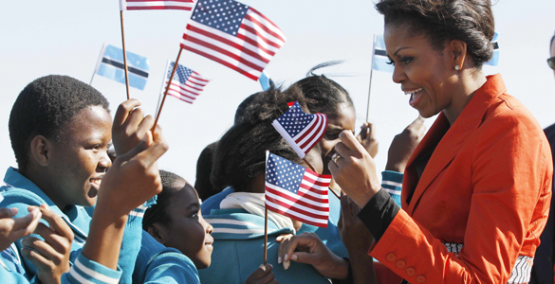
South Africa: Michelle Obama Reaches Out to Youth, Highlights Importance of Leadership for Country’s Future
CAPE TOWN, South Africa (June 24, 2011) – U.S. first lady Michelle Obama’s visit to South Africa has brought the world’s attention to a country where a significant percentage of the population must struggle to survive on less than $1 a day, according to the United Nations.
During her week-long goodwill tour through South Africa, the first lady’s focus was on the country’s youth and their vital role in its future.
During her June 22 speech addressing the Young African Women Leaders Forum in a Soweto township in Johannesburg, Mrs. Obama touched on the fact that in Africa, “people under 25 make up 60 percent of the population. And here in South Africa, nearly two-thirds of citizens are under the age of 30. So over the next 20 years, the next 50 years, our future will be shaped by your leadership.”
She then paused and asked the audience to think about the meaning of the word “leadership.”
“Because I know that so often, when we think about what that word means, what it means to be a leader, we think of presidents and prime ministers,” Mrs. Obama said in her speech. “And most young people don’t fit that image.”
She went on to talk about her belief that youth can be true leaders, and that the time is now.
“I am here because I know that true leadership—leadership that lifts families, leadership that sustains communities and transforms nations—that kind of leadership rarely starts in palaces or parliaments. That kind of leadership is not limited only to those of a certain age or status. And that kind of leadership is not just about dramatic events that change the course of history in an instant.”
Throughout South Africa, there are programs dedicated to the empowerment of youth—providing education and teaching leadership skills that will reshape the country and the world.
“It is only through the youth, that change truly happens,” says Father Mark Hyde, director of Salesian Missions, which operates such programs. “Through education and opportunities, we can fight poverty and open doors to a better life for the people of South Africa, and the world.”
The Salesians are providing hope to South African young people, he adds, many of which struggle to find their way in a country hardest hit by the HIV/AIDS crisis and plagued with high crime, and gender-based violence against women and girls.
“There is an urgent need for education to help prevent the spread of the deadly virus,” says Fr. Hyde, noting that the Salesians have been helping the children of South Africa since 1951.
Most recently, the Salesians have been working on HIV/AIDS prevention through a U.S. government-funded project that is part of the President's Emergency Plan for AIDS Relief (PEPFAR).
Working in schools from grades 4 through 12, the “Life Choices” program aims to decrease HIV/AIDS prevalence, teen pregnancy, substance abuse and violence among youth.
"An important component is HIV voluntary counseling and testing as an effective method of preventing new infections," says Nolawi Eshetu of the Salesian Missions Office for International Programs headquartered in New Rochelle, NY.
"The program also offers one-on-one counseling, career and guidance counseling, parental skills workshops and teacher sensitivity," Eshetu adds, speaking from his home country of Ethiopia, where he is working on program similar to the one in South Africa.
In a country devastated by HIV/AIDS and where 10 million people die every year from hunger-related diseases—according to the United Nations—breaking the cycle of poverty is a challenge that requires a comprehensive approach.
“But fighting disease and feeding them alone will not create brighter futures,” says Fr. Hyde. “We work each and every day in South Africa—and around the globe—to teach youth to care for themselves and for others. We work to create educated leaders out of youth that otherwise would see little in their futures.”
At the Salesian Missions “Learn to Live” educational program in Cape Town, homeless street children arrive each day eager to learn and escape their lives on the street. Children ages 16 and younger learn math, literacy and life skills. Older students receive technical and vocational training.
“All youth become empowered to permanently leave the streets, continue schooling, obtain jobs and be reintegrated with their families and society,” says Fr. Hyde. “They receive the tools and guidance to do this. But most importantly, they have someone who believes in them.”
